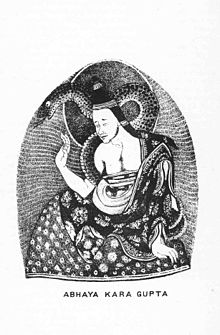
Abhayākaragupta (Wylie: 'jigs-med 'byung-gnas sbas-pa) was a Buddhist monk, scholar and tantric master (vajracarya) and the abbot of Vikramasila monastery in modern-day, Bihar in India. He was born in somewhere in Eastern India,[1] and is thought to have flourished in the late 11th-early 12th century CE, and died in 1125.[2][3]
Abhayākaragupta's magnum opus, the Vajravali, is a "grand synthesis of tantric liturgy" which developed a single harmonized tantric ritual system which could be applied to all Tantric Buddhist mandalas.[4]
According to A.K. Warder, Abhayākaragupta developed the Mantrayana-Madhyamaka doctrine to its final Indic form.[5] Matthew Kapstein sees him as "among the last great masters of Buddhism in India."[6]
- ^ Buswell, Robert; Lopez, Donald (2014). The Princeton Dictionary of Buddhism. Princeton University Press. p. 2. ISBN 9780691157863.
- ^ Nakamura, Hajime. (1980) Indian Buddhism: A Survey with Biographical Notes. 1st Indian Edition (1987), Motilal Barnasidass, Delhi, p. 335.
- ^ Warder, A. K. (1970) Indian Buddhism. 2nd revised edition: Motilal Banarsidass, Delhi. (1970), p. 485.
- ^ Yong-Hyun Lee, Synthesizing a Liturgical Heritage: Abhayākaragupta's Vajravali and the Kalacakramandala
- ^ Warder, A. K. (1970) Indian Buddhism. 2nd revised edition: Motilal Banarsidass, Delhi. (1970), p. 505.
- ^ Kapstein, Matthew. Reason's Traces Identity and Interpretation in Indian and Tibetan Buddhist Thought, Wisdom Pubs. Boston, page 393
© MMXXIII Rich X Search. We shall prevail. All rights reserved. Rich X Search
